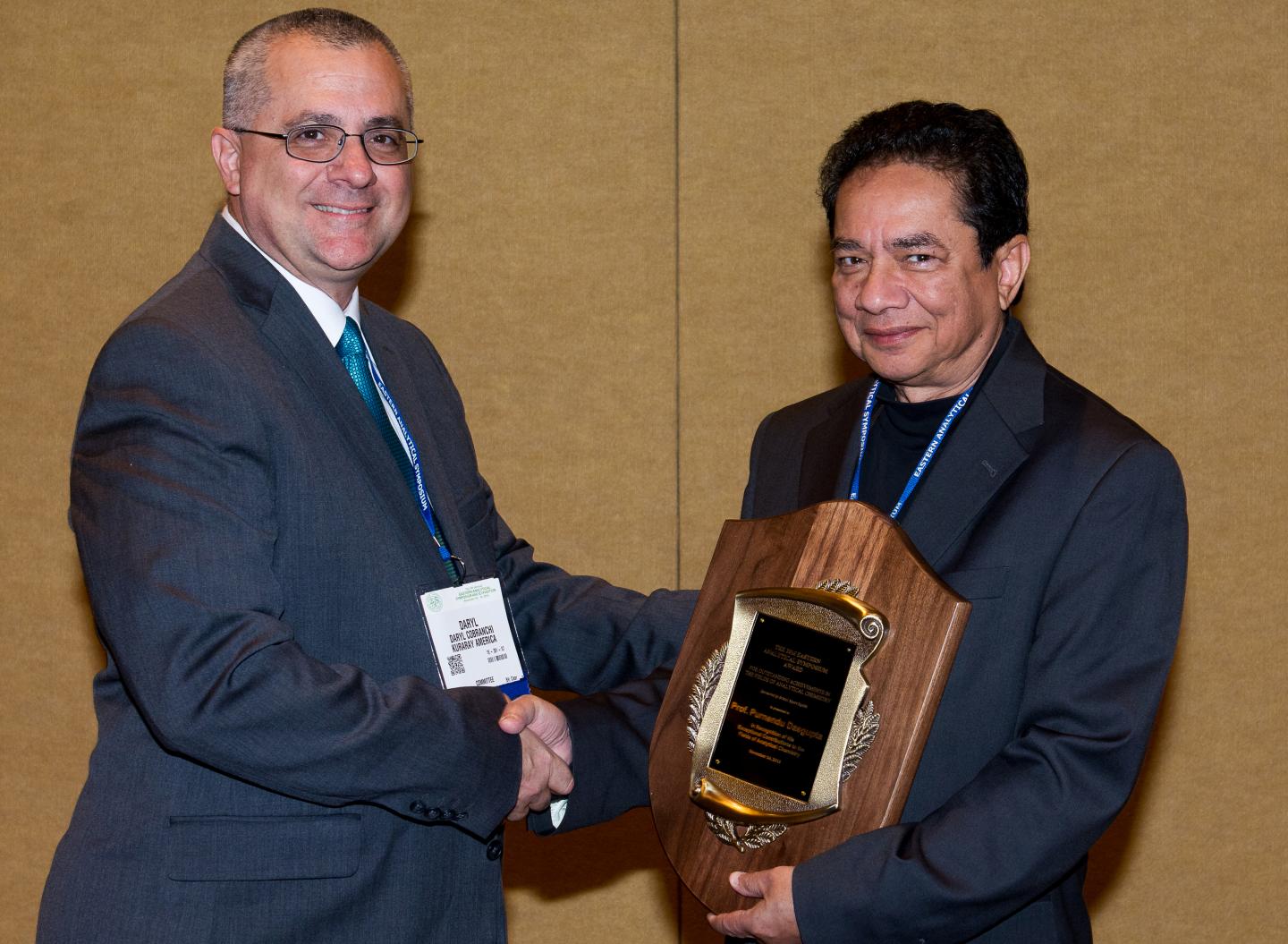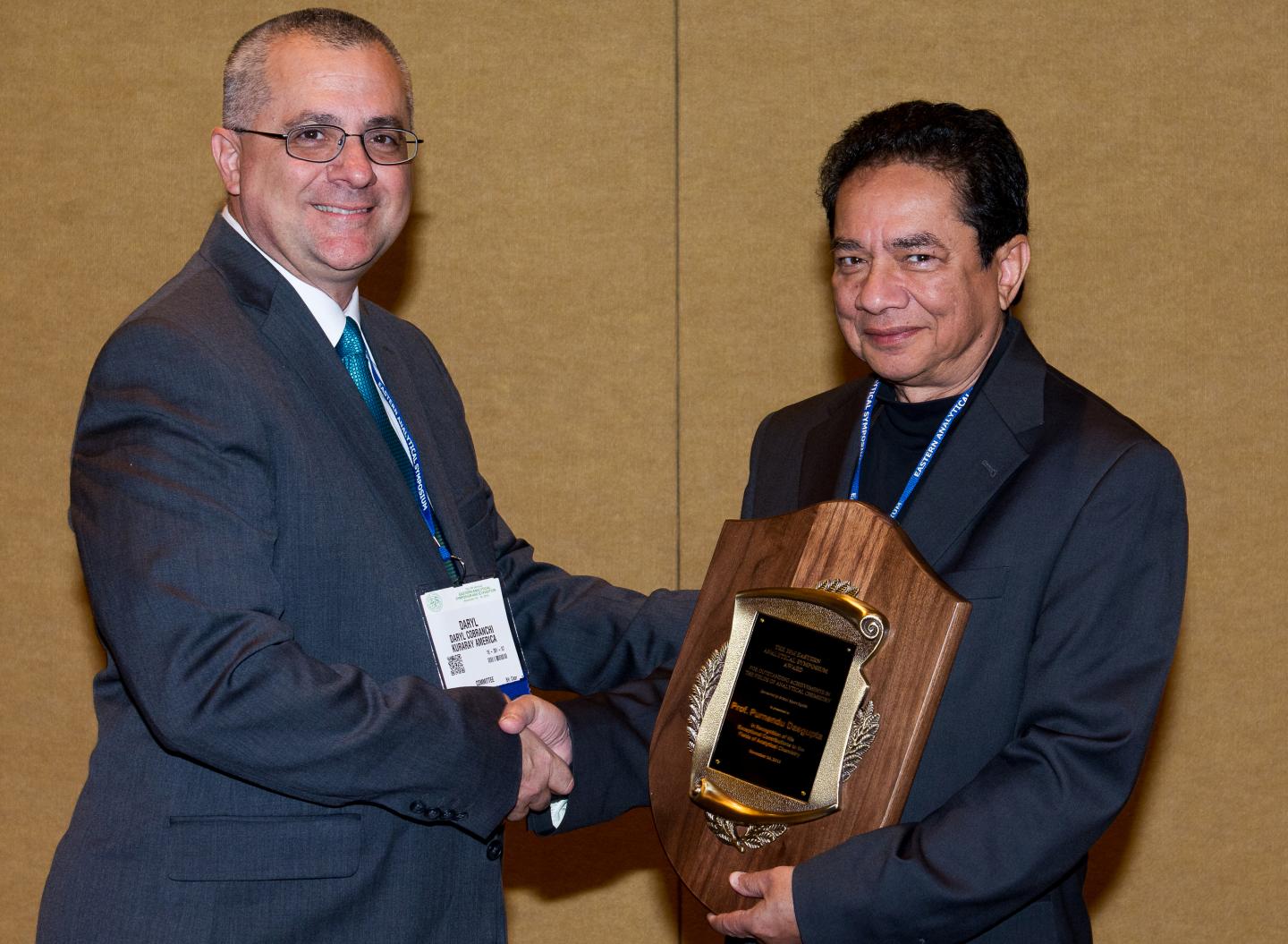
Credit: EAS
A chemistry professor at The University of Texas at Arlington has been honored with a prestigious award for his groundbreaking contributions to the fields of analytical chemistry.
Purnendu "Sandy" Dasgupta, the Hamish Small Chair of Ion Analysis in the Department of Chemistry and Biochemistry at UTA, was named recipient of the 2016 Eastern Analytical Symposium's highest award, the Award for Outstanding Achievements in the Fields of Analytical Chemistry. Dasgupta was presented with the award during the organization's annual meeting in Somerset, N.J. "This is a tremendous honor and I'm very grateful for this recognition by my peers," Dasgupta said. "This award means so much to me because it is a rare one that does not recognize expertise in a specific area but recognizes broad contributions across the fields of analytical chemistry."
The Eastern Analytical Symposium and Exposition is held each year to provide professional scientists and students continuing education in the analytical and allied sciences through the presentation of symposia of papers, workshops and short courses. College of Science Dean Morteza Khaledi said that the EAS Award is a well-deserved honor for Dasgupta, noting that many of Dasgupta's important contributions to analytical chemistry have had significant positive impact on health and the human condition, one of the main pillars of UTA's Strategic Plan 2020: Bold Solutions | Global Impact.
"Through his research Dr. Dasgupta has done so much to address critical issues related to improving human health and the methods we use to treat disease and illness," Khaledi said. "His innovations and contributions across an array of fields make him a most worthy recipient of this prestigious award."
The honor was made all the more special for Dasgupta by the presence at the awards ceremony of many close friends and colleagues, including Janusz Pawliszyn of the University of Waterloo in Ontario, Canada; Satinder Ahuja, president of Ahuja Consulting; Chris Pohl and Kannan Srinivasan of Thermo Fisher, a biotechnology product development company; Graham Marshall, president of Global FIA, a technology company specializing in flow-based analysis techniques; William Barber of Agilent Technologies, a public research, development and manufacturing company; and Kevin Schug, Shimadzu Distinguished Professor of Analytical Chemistry in the Department of Chemistry and Biochemistry at UTA.
Dasgupta, who joined UTA in 2007 following 25 distinguished years at Texas Tech University, has won numerous awards over the course of his career. In August, he received the Tech Titans Technology Inventors Award, presented by the Technology Association of North Texas, for his many innovations in chemical and environmental analysis.
Other honors he has received include the 2015 American Chemical Society Division of Analytical Chemistry J. Calvin Giddings Award for Excellence in Education; the 2012 Stephen Dal Nogare Award in Chromatography; the 2012 Wilfred T. Doherty Award, DFW Section of the ACS; and the 2011 ACS Award in Chromatography. He also was named a Fellow of the Institute of Electrical and Electronics Engineers and an honorary member of the Japan Society of Analytical Chemistry, both in 2015.
Among his recent research projects, Dasgupta led a team which devised a new method to measure the amount of blood present in dry blood spot analysis, providing a new alternative to the current preferred approach of measuring sodium levels. Dry blood spot analysis is simple and inexpensive and is routinely used to screen newborns for metabolic disorders. It also has proven effective in diagnosing infant HIV infection, especially in developing countries where health budgets are limited.
Another of Dasgupta's recent projects is the development of a prototype for an implantable in-line shunt flow monitoring system for hydrocephalus patients, which could lead to better treatment, especially in infants and children who account for a large percentage of shunt operations every year. In another project, Dasgupta is using a $1.2 million grant from NASA to further the search for amino acids, the so-called building blocks of life, by extending a platform that he developed to detect and separate ions.
Dasgupta's active research areas also include methods for environmentally friendly analysis of arsenic in drinking water; rapid analysis of trace heavy metals in the atmosphere; iodine nutrition in women and infants and the role of the chemical perchlorate; and the development of a NASA-funded ion chromatograph for testing extraterrestrial soil, such as that found on Mars.
Dasgupta received a bachelor's degree with honors in Chemistry from Bankura Christian College in 1968 and a master's degree in inorganic chemistry from the University of Burdwan in 1970, both located in West Bengal, India. He came to the United States in 1973 and earned his doctorate in analytical chemistry under Philip W. West, with a minor in electrical engineering, from Louisiana State University in 1977.
After working as an instructor at LSU, as a research chemist at the California Primate Research Center and as an adjunct assistant professor in the Department of Civil and Environmental Engineering at the University of California at Davis, he joined Texas Tech University, where he did award-winning research and attained the rank of Paul Whitfield Horn Professor, the institution's highest honor. He has published more than 400 papers and holds 27 patents.
###
The University of Texas at Arlington
The University of Texas at Arlington is a Carnegie Research-1 "highest research activity" institution. With a projected global enrollment of close to 57,000 in AY 2016-17, UTA is the largest institution in The University of Texas System. Guided by its Strategic Plan Bold Solutions | Global Impact, UTA fosters interdisciplinary research within four broad themes: health and the human condition, sustainable urban communities, global environmental impact, and data-driven discovery. UTA was recently cited by U.S. News & World Report as having the second lowest average student debt among U.S. universities. U.S. News & World Report also ranks UTA fifth in the nation for undergraduate diversity. The University is a Hispanic-Serving Institution and is ranked as the top four-year college in Texas for veterans on Military Times' 2017 Best for Vets list.
Media Contact
Louisa Kellie
[email protected]
817-524-8926
@utarlington
http://www.uta.edu
############
Story Source: Materials provided by Scienmag





